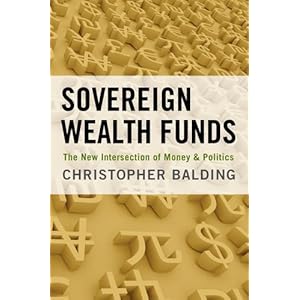Prof. Christopher Balding's Work @ Singapore Public Finances
-
Citation: christopherbalding.comBiography
Christopher Balding is a professor of business and economics at the HSBC Business School at the Peking University Graduate School. An expert in sovereign wealth funds, he has published in such leading journals as the Review of International Economics, the Journal of Public Economic Theory, and theInternational Finance Review on such diverse topics as CDS pricing, the WTO, and the economics of adoption and abortion. His work as been cited by a variety of media outlets including the Wall Street Journal and the Financial Times. he recently released a book entitled Sovereign Wealth Funds: The New Intersection of Money and Power published by Oxford University Press. Prof. Balding received his Phd from the University of California, Irvine and worked in private equity prior to entering academia.
Academic Research
His academic research is varied and diverse covering whatever he find intriguing. His primary areas are international and public economics.
He recently released a short paper on the inflated returns of the Singaporean sovereign wealth fund Temasek Holdings. Nobody outperforms the market by that much for 35 years. How do you run 30 years of surplusesand become one of the most indebted countries in the world? This one doesn’t pass the smell test.
As a follow up paper to The New Intersection of Money and Power, he wrote a short piece which you can find here about the inflated returns of the Singaporean fund Temasek Holdings.
Balding, Christopher, A Brief Research Note on Temasek Holdings and Singapore: Mr. Madoff Goes to Singapore (February 8, 2012).
Available at SSRN:
http://ssrn.com/abstract=2001343
http://dx.doi.org/10.2139/ssrn.2001343
Abstract:
Financial data reported by Temasek Holdings and Singapore reveal problematic characteristics. First, Temasek reports an average annual return of 17% for 35 years despite Singaporean stock returns averaging less than 8% during this same time period. Given the range of stock market returns and its portfolio companies’ returns, it is highly improbably that Temasek has earned the returns claimed in its annual reports. Second, Singapore has become one of the most indebted countries in the world despite supposedly running large and sustained government surpluses. Given publicly available economic data on Singaporean finances, there is a minimum of $350 billion SGD or $275 billion USD unaccounted for from historical surpluses and financing operations. Third, given these results I find that for every $1 SGD in public borrowing, Singapore has received only 25 cents of publicly held Singaporean assets. Either financial returns have been drastically overstated or there are large unreported Singaporean controlled holdings.